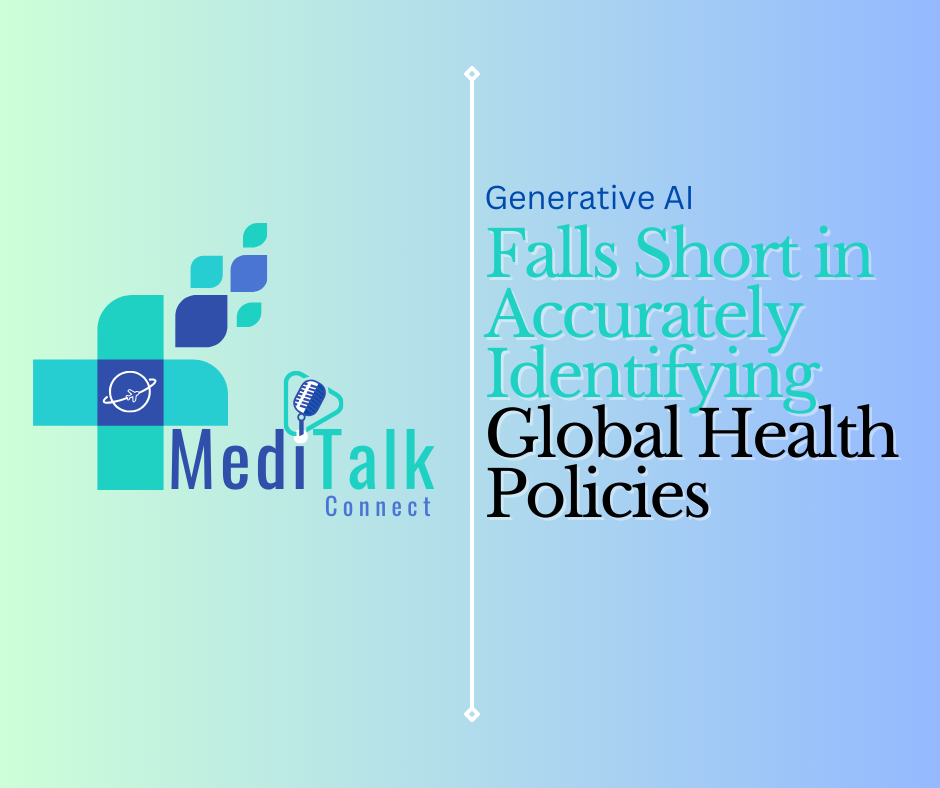In recent years, Generative AI has shown immense potential in transforming industries, from automating mundane tasks to aiding critical decision-making processes. However, when it comes to the nuanced and complex field of global health policies, Generative AI struggles to deliver accuracy, reliability, and actionable insights.
The Promise of Generative AI in Global Health
Generative AI, powered by advanced machine learning algorithms, offers unmatched speed in processing vast amounts of data. For global health policies, it holds the promise of:
- Analyzing epidemiological data to predict outbreaks.
- Synthesizing reports on healthcare access and inequities.
- Assisting policymakers in drafting initiatives by drawing insights from global data.
Despite these promises, the reality is far less optimistic.
The Complex Nature of Global Health Policies
Global health policies are not just about numbers or patterns; they involve:
- Cultural Contexts: Policies must consider cultural sensitivities and social norms. AI often lacks the context needed to address such subtleties.
- Multifaceted Stakeholders: Policies are shaped by governments, NGOs, private entities, and global health organizations like the WHO. AI cannot replicate the intricate negotiation and consensus-building processes involved.
- Dynamic Regulations: Health policies are fluid and vary across nations. AI struggles to keep up with constantly changing regulations and legislation.
These factors create a landscape too intricate for current AI systems to navigate effectively.
Where Generative AI Falls Short
1. Data Quality and Bias
Global health policies require clean, unbiased, and comprehensive datasets. AI systems are only as good as the data they are trained on. However, in global health:
- Data from low-income countries is often incomplete or unreliable.
- Historical data may reflect biases, leading to skewed outputs.
- AI might prioritize metrics over equity, which can misrepresent the actual needs of marginalized populations.
2. Lack of Ethical Frameworks
AI lacks an intrinsic moral compass. Ethical considerations, such as resource allocation and human rights, play a central role in health policymaking. Generative AI often fails to account for these complexities, making its recommendations not only impractical but potentially harmful.
3. Inability to Capture Nuance
AI might excel in identifying patterns, but it struggles with qualitative aspects such as:
- Understanding cultural nuances behind policy decisions.
- Incorporating historical or geopolitical contexts.
- Predicting the socio-economic ripple effects of a health policy.
For example, an AI might suggest a lockdown to control a pandemic without recognizing its devastating impact on daily wage workers in certain regions.
Case Studies: Generative AI’s Limitations in Action
COVID-19 Policy Recommendations
During the COVID-19 pandemic, AI systems were deployed to aid policy decisions. While AI could analyze infection rates and hospital capacities, its recommendations often fell short in addressing:
- Disparities in vaccine distribution.
- Social resistance to health mandates based on cultural beliefs.
- Economic consequences of prolonged restrictions.
Healthcare Access Models in Sub-Saharan Africa
AI models aimed at improving healthcare access in Sub-Saharan Africa often recommended solutions based on Western frameworks. These failed to account for:
- Local healthcare infrastructure challenges.
- The role of traditional medicine in communities.
- Political instability affecting resource allocation.
Addressing the Gaps
To leverage the potential of Generative AI while overcoming its limitations in global health policy, the following steps must be prioritized:
1. Invest in Diverse, High-Quality Data
Global health data must be:
- Inclusive of marginalized communities.
- Regularly updated to reflect changing dynamics.
- Carefully cleaned to avoid reinforcing biases.
2. Integrate Human Oversight
AI should augment human decision-making, not replace it. A multidisciplinary team of policymakers, healthcare professionals, and ethicists should evaluate AI outputs before implementation.
3. Develop Ethical Guidelines
Clear frameworks must govern how AI is used in health policymaking, ensuring fairness, equity, and respect for human rights.
4. Focus on Explainability
AI outputs should be transparent, providing clear explanations for their recommendations. This builds trust and allows for informed decision-making.
5. Embrace Localization
AI models must adapt to local contexts. This requires training algorithms on region-specific data and involving local experts in the policymaking process.
Conclusion
Generative AI has the potential to revolutionize global health policies, but its current limitations highlight the need for caution. While it can analyze data and offer insights, it cannot replace the human judgment and ethical considerations required in this field. By addressing these gaps and fostering collaboration between AI and human expertise, we can unlock AI’s true potential to drive equitable and effective global health solutions.
The journey toward harnessing AI for global health is far from complete, but by taking actionable steps today, we can pave the way for a healthier, more inclusive tomorrow.



